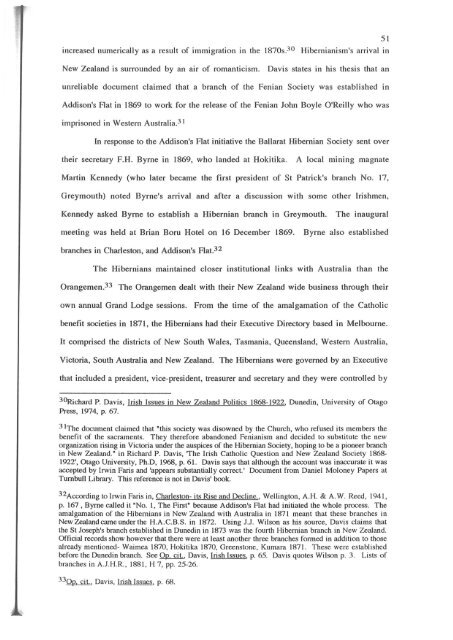TRANSPLANTED IRISH INSTITUTIONS - University of Canterbury
TRANSPLANTED IRISH INSTITUTIONS - University of Canterbury
TRANSPLANTED IRISH INSTITUTIONS - University of Canterbury
You also want an ePaper? Increase the reach of your titles
YUMPU automatically turns print PDFs into web optimized ePapers that Google loves.
increased numerically as a result <strong>of</strong> immigration in the 1870s. 30 Hibernianism's arrival in<br />
51<br />
New Zealand is surrounded by an air <strong>of</strong> romanticism.<br />
Davis states in his thesis that an<br />
unreliable document claimed that a branch <strong>of</strong> the Fenian Society was established in<br />
Addison's Rat in 1869 to work for the release <strong>of</strong> the Fenian John Boyle O'Reilly who was<br />
imprisoned in Western Australia. 3l<br />
In response to the Addison's Flat initiative the Ballarat Hibernian Society sent over<br />
their secretary F.H. Byrne in 1869, who landed at Hokitika.<br />
A local mining magnate<br />
Martin Kennedy (who later became the first president <strong>of</strong> St Patrick's branch No. 17,<br />
Greymouth) noted Byrne's arrival and after a discussion with some other Irishmen,<br />
Kennedy asked Byrne to establish a Hibernian branch in Greymouth.<br />
The inaugural<br />
meeting was held at Brian Boru Hotel on 16 December 1869.<br />
Byrne also established<br />
branches in Charleston, and Addison's Flat. 32<br />
The Hibernians maintained closer institutional links with Australia than the<br />
Orangemen. 33 The Orangemen dealt with their New Zealand wide business through their<br />
own annual Grand Lodge sessions. From the time <strong>of</strong> the amalgamation <strong>of</strong> the Catholic<br />
benefit societies in 1871, the Hibernians had their Executive Directory based in Melbourne.<br />
It comprised the districts <strong>of</strong> New South Wales, Tasmania, Queensland, Western Australia,<br />
Victoria, South Australia and New Zealand. The Hibernians were governed by an Executive<br />
that included a president, vice-president, treasurer and secretary and they were controlled by<br />
3~chard P. Davis, Irish Issues in New Zealand Politics 1868-1922, Dunedin, <strong>University</strong> <strong>of</strong> Otago<br />
Press, 1974, p. 67.<br />
31The document claimed that "this society was disowned by the Church, who refused its members the<br />
benefit <strong>of</strong> the sacraments. They therefore abandoned Fenianism and decided to substitute the new<br />
organization rising in Victoria under the auspices <strong>of</strong> the Hibernian Society, hoping to be a pioneer branch<br />
in New Zealand." in Richard P. Davis, 'The Irish Catholic Question and New Zealand Society 1868-<br />
1922', Otago <strong>University</strong>, Ph.D, 1968, p. 61. Davis says that although the account was inaccurate it was<br />
accepted by Irwin Faris and 'appears substantially correct.' Document from Daniel Moloney Papers at<br />
Turnbull Library. This reference is not in Davis' book.<br />
32According to Irwin Faris in, Charleston- its Rise and Decline., Wellington, A.H. & A. W. Reed, 1941,<br />
p. 167, Byrne called it "No. I, The First" because Addison's Rat had initiated the whole process. The<br />
amalgamation <strong>of</strong> the Hibernians in New Zealand with Australia in 1871 meant that these branches in<br />
New Zealand carne under the H.A.C.B.S. in 1872. Using J.1. Wilson as his source, Davis claims that<br />
the St Joseph's branch established in Dunedin in 1873 was the fourth Hibernian branch in New Zealand.<br />
Official records show however that there were at least another three branches fonned in addition to those<br />
already mentioned- Waimea 1870, Hokitika 1870, Greenstone, Kumara 1871. These were established<br />
before the Dunedin branch. See Op. cit., Davis, Irish Issues, p. 65. Davis quotes Wilson p. 3. Lists <strong>of</strong><br />
branches in A.J.H.R., 1881, H 7, pp. 25-26.<br />
330p, cit., Davis, Irish Issues, p. 68.
















